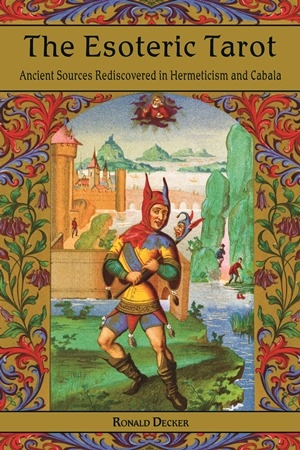The Esoteric Tarot
Ancient Sources Rediscovered in Hermeticism and Cabala
- 2013 INDIES Finalist
- Finalist, Body, Mind & Spirit (Adult Nonfiction)
Artist suggests combining academia and mysticism for a better understanding of Tarot card history and divination.
Scholars of the Tarot and historians of the esoteric and mystic arts will find much to appreciate in Ronald Decker’s investigation into the history, symbology, and meaning of Tarot—long mired in mystery, legend, and conjecture. Drawing on his training as an artist and art historian, Decker calls upon ancient references to present an interpretation that he suggests will surprise Tarotists and academicians alike.
Not for the merely curious, The Esoteric Tarot offers in-depth historical information that will appeal to serious students, from the different types of cards that existed throughout history to the people, some of them quite eccentric, who influenced the evolution of Tarot. His meticulous and amply illustrated research admirably integrates astrological, arithmological, and mystagogical systems to show how Tarot, once merely a card game, became the popular divination tool it is today, mainly due to the efforts of an eighteenth-century Parisian fortune teller.
“In my research, I never followed any particular agenda or became the spokesman for any particular doctrine,” writes Decker. “I independently discovered clues and followed them wherever they led.”
While he lays no claim to definitive conclusions, noting the scarcity of hard evidence on the topic, Decker dispels the myth that the Tarot was an ancient Egyptian device for divination. “The Tarot was not invented by Egyptians,” he writes, “but I am certain that their inventor was a great admirer of Egypt.”
Of great interest is Decker’s research into cabala, the dominant form of Jewish mysticism. Based on ancient teachings and formulated in the Middle Ages, the teachings of cabala were kept secret from all but the initiated. Nevertheless, Decker traces the ways in which cabalistic symbolism played a significant role in the development of Tarot.
Citing how Tarotists and academics have often been at odds in explaining the history and meaning of the cards, Decker demonstrates that the Tarotist’s insight into symbols and the academic’s historical knowledge can actually be combined for a fuller and richer interpretation.
Decker holds a BA in fine art from State University College in Buffalo and an MA in painting from the University of Cincinnati. He has taught art and art history at all educational levels and, until his retirement, was curator of antique cards at the United States Playing Card Company.
With a particular interest in Tarot cards, he has traveled to all of Europe’s capitals as well as to Turkey, Egypt, and India to study them in public and private collections.
Reviewed by
Kristine Morris
Disclosure: This article is not an endorsement, but a review. The publisher of this book provided free copies of the book to have their book reviewed by a professional reviewer. No fee was paid by the publisher for this review. Foreword Reviews only recommends books that we love. Foreword Magazine, Inc. is disclosing this in accordance with the Federal Trade Commission’s 16 CFR, Part 255.

